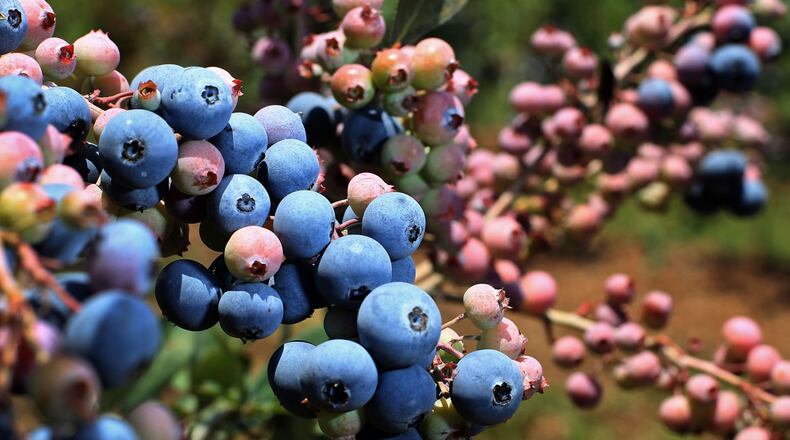Blueberries were considered a lucrative bet when Jerome Crosby began planting them on his farm in Willacoochee about 15 years ago. Then the Mexican competition arrived.
Prices at local grocery stores plunged as Crosby and his American counterparts were forced to compete with the surge of low-priced produce from below the border.
“They’ve forced us to an unprofitable level,” he said.
Crosby and other Southeastern produce farmers blame Mexico’s low labor costs and less stringent regulations for what they see as unfair competition. So they saw an opportunity when President Donald Trump announced plans to renegotiate the North American Free Trade Agreement.
The sentiment quickly changed to fury when the replacement deal, the U.S. Mexico Canada Agreement, emerged late last year without any new protections for their industry.
The omission has created a dividing line within Georgia’s powerful agriculture community — one that also presents a political challenge to local lawmakers as they mull whether to support the new trade agreement on Capitol Hill.
On the one side are many of the state’s and country’s most powerful agriculture interests, including U.S. Agriculture Secretary Sonny Perdue, a former Georgia governor. Also supportive are those with ties to powerhouse crops such as cotton that benefited from NAFTA and see the USMCA as a continuation or improvement on the status quo.
But for those who were hoping for some major changes to NAFTA — particularly farmers growing seasonal produce such as blueberries, peppers, squash and tomatoes who have had to contend with stiff competition from Mexico — the replacement deal is woefully inadequate, and they’re urging lawmakers to reject it when it comes up for a vote as soon as this summer.
The USMCA could be "tantamount to distributing U.S. government-printed 'going out of business' signs across a substantial part of rural Georgia and the Southeast," said Georgia Agriculture Commissioner Gary Black, a Trump-aligned Republican who testified last year on behalf of Georgia produce farmers before the International Trade Commission.
Winners and losers
Since it went into effect more than 25 years ago, NAFTA has remade broad swaths of Georgia's economy.
Many textile and manufacturing jobs left the state, hampering small-town life from Rome and West Point.
But it also created new opportunities for some of Georgia’s biggest industries. The state’s top exports to Canada and Mexico now run the gamut from automobiles to acrylic polymers.
The agreement has also had a transformative effect on local agriculture, opening up new markets of hungry customers to the north and south.
Cotton and peanuts were big winners, as was poultry. Exports of U.S. broiler chickens to Canada and Mexico soared from $100 million in 1994 to a high of $735 million in 2013, a boom that flowed to Georgia, the country’s biggest poultry producer. (Poultry exports were about $519 million in 2018, the most recent figures available from the U.S. Department of Agriculture.)
Because of that, many local agriculture interests were holding their breath as NAFTA was being renegotiated. They didn’t want to lose any market access.
“It doesn’t get any better than duty-free access,” said James Sumner, the president of the Stone Mountain-based U.S. Poultry & Egg Export Council. “We have duty-free access to Mexico under NAFTA, and USMCA really doesn’t change that, fortunately.”
Wood pulp and paper products are also among Georgia's top exports, and the timber industry's national trade group, the American Forest and Paper Association, is also a fan of the agreement.
NAFTA has provided “sizable benefits to Georgia,” said Jake Handelsman, the group’s senior director for international trade, and the USMCA is expected to continue those benefits. “What it does do is sort of solidify market access,” he said.
‘Breathtaking’ losses
Not every Georgia producer came out a winner under NAFTA.
Once harvested, fresh produce must be sold within days or weeks, regardless of the price. That’s what made it so difficult when increasing amounts of produce from Mexico — whose fruit and vegetable harvest season directly overlaps Georgia’s — began flowing into the U.S. for a fraction of the price of American-grown goods.
Bill Brim, a Tift County farmer, said he was selling squash for $12 to $16 a box last year until Mexican imports came onto the local market, which sent prices plummeting to $4.50.
“The box itself costs $1, so it’d be tough to produce a box of squash for $3.50 without government subsidies and cheap labor,” he said.
Charles Hall, the executive director of the Georgia Fruit and Vegetable Growers Association, said U.S. produce growers have extremely limited ways to fight back against import dumping under NAFTA. His organization was looking to lower the threshold for bringing cases before the World Trade Organization as the deal was being renegotiated, but a special provision for seasonal and perishable agriculture products was pulled from the agreement at the eleventh hour, he said.
“We’re not trying to keep (Mexico) from producing,” Hall said. “The objective here is to make sure we’re on a level playing field.”
Some in the produce industry have been circulating a recent University of Georgia study that estimated the state could lose nearly $1 billion in annual economic output and more than 8,000 jobs "unless something occurs to slow down the increase in low-priced Mexican imports of blueberries and vegetables."
The study warned that if current trends continue, they would lead to “truly breathtaking income losses,” particularly in agriculture-heavy rural counties. In the case of Clinch and Echols counties in South Georgia, it predicted economic damage could be on the scale of the Great Depression.
More market access
Produce growers’ opposition to USMCA has put them on the opposite sides of influential business and farm groups such as the American Farm Bureau Federation and U.S. Chamber of Commerce.
One of the deal's top salesmen has been Perdue, who recently authored an op-ed in The Columbus Ledger-Enquirer eviscerating the UGA study.
His alma mater’s conclusions, Perdue wrote, neglect to mention that produce farmers already face cheap competition from Mexico under NAFTA, and the researchers “overlook the ways the Administration is fighting for a level playing field in the seasonal fruit and vegetable market.”
He said Georgia’s vegetable, fruit and nut sales have increased over the past 10 years under NAFTA and that the replacement deal would be a major win for the state’s entire agriculture industry by “ensuring better market access and solidifying commitments to fair and science-based trade rules with our top trading partners.”
Local members of Congress have largely sidestepped the public fight so far, including lawmakers representing ag-heavy districts such as U.S. Reps. Austin Scott, R-Tifton, and Sanford Bishop, D-Albany.
USMCA touches on issues far broader than agriculture — such as intellectual property, car manufacturing and financial services — and many officials are keeping their cards close to the vest. Others, including Republican U.S. Sens. Johnny Isakson and David Perdue, have indicated they're generally supportive as they review the details of the agreement, even as several local lawmakers wrote to U.S. Trade Representative Robert Lighthizer in April urging the Trump administration to "ensure that clear rules are in place to defend domestic seasonal and perishable produce from unfair trade practices."
Congressional leaders have not laid out a timeline for considering the USMCA on the House and Senate floors, but Speaker Nancy Pelosi has requested changes to some of the deal’s environmental and labor-related provisions.
The deal’s political prospects became even more uncertain this week, when Trump announced plans to levy tariffs on Mexican imports to force the government to take a stricter stand on border security. Some analysts expressed concern the action could undermine the NAFTA replacement deal.
Black, the state’s agriculture commissioner and an opponent of the agreement, sees its ratification as likely and is now pushing for other regulatory and legislative remedies that could aid Georgia’s produce industry through existing trade authorities. He’s also placing greater emphasis on the state’s “Georgia Grown” initiative to increase public awareness of locally grown food.
“I’m still a firm believer that people, if they know where it comes from and understand the story behind it and sometimes the premium that goes with that … embrace local,” he said in an interview. “It’s our job to get into the marketplace and sell it. We’re going to have to be far more aggressive.”
On his 350-acre blueberry farm in South Georgia, Crosby is already contending with the shifting trade landscape. He’s let go a handful of employees — half of his full-time workforce from five years ago — to keep operations afloat.
“I would say every farm has had to eliminate personnel and find mechanical means to replace U.S. jobs,” said Crosby, the chairman of the Georgia Blueberry Commission. “It’s the new normal.”
Stay on top of what’s happening in Georgia government and politics at www.ajc.com/politics.
About the Author
Keep Reading
The Latest
Featured



